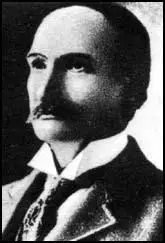Frank James

Frank James was born in Clay County, Missouri on 10th January, 1843. His father left home as a child in search of gold in California and never returned. Frank and his brother Jessie James were brought up by their mother, Zeralda James.
The James family were owners of slaves and supported the Confederate Army during the American Civil War. In 1862 William Quantrill established a band of guerilla fighters. Frank James joined and other members of the gang included Jessie James, Cole Younger and James Younger.
As well as attacking Union troops the Quantrill Raiders also robbed mail coaches, murdered supporters of Abraham Lincoln and persecuted communities in Missouri and Kansas that Quantrill considered to be anti-Confederate. The gang also gained a reputation for murdering members of the Union Army that the gang had taken prisoner.
On 21st August, 1863, the Quantrill Raiders committed one of the worst atrocities of the Civil War when it attacked the town of Lawrence. During the raid Quantrill's gang killed 150 inhabitants and set fire to over 180 buildings. Frank James was with William Quantrill when he was killed in Kentucky in 1865.
After the war Frank and his brother Jessie James became outlaws and established a gang that included Bob Younger, Cole Younger, James Younger, Bill Chadwell, Clell Miller and Charlie Pitts.
On 13th February, 1866, the gang robbed a bank at Liberty, Missouri. Over the next few years the brothers took part in twelve bank robberies, seven train robberies, four stage-coach robberies and various other criminal acts. During these crimes at least eleven citizens were killed by the gang. As well as their home state of Missouri they were also active in West Virginia, Alabama, Arkansas, Iowa, Kansas and Minnesota.
On 7th September, 1876, the gang attempted to rob the First National Bank in Northfield, Minnesota. During the raid one of the gang shot and killed the cashier, Lee Heywood. Members of the town decided to fight back and they opened fire on the gang. Bill Chadwell, Clell Miller and Charlie Pitts were killed whereas Bob Younger, Cole Younger and James Younger, were all wounded and captured.
Frank James and Jessie James were also wounded but managed to get away from Northfield. After this disaster Frank decided to go into hiding and rented a home in Nashville, Tennessee. Jessie and Frank also began to recruit a new gang that included Robert Ford, Charlie Ford and Dick Liddel.
On 8th October, 1879, the gang held up the Chicago & Alton Railroad at Glendale, Missouri and stole $6,000. This was followed by other raids, in one, at Blue Cut, Missouri, in September, 1881, the gang killed the conductor and a pensioner. The governor of Missouri, Thomas Crittenden, now responded by offering a reward of $10,000 for the capture of Jessie James.
Robert Ford, a member of the Jessie James gang, contacted Governor Crittenden and offered his services in order to gain this reward. On 3rd April, 1882, Ford visited Jessie James in his home and when he stood on a chair to straighten a picture on the wall, he shot him in the back of the head. Ford was found guilty of murder and sentenced to death. Two hours later he was pardoned by Crittenden and given his reward.
Frank James and Jessie James were also wounded but managed to get back to Missouri. The governor of Missouri, Thomas Crittenden, now offered a reward of $10,000 for the capture of Jessie James. On 3rd April, 1882, Robert Ford, a recent recruit to the gang, shot Jessie James in the back of the head as he stood on a chair to straighten a picture on the wall. Ford was found guilty of murder but was immediately pardoned by Crittenden and given his reward.
Frank James was well aware that he would also be the target of an assassination attack and on 5th October, 1882, surrendered to the authorities. He was charged with the murder of a passenger during a train robbery in Winston. At the beginning of the trial the prosecutor predicted that James would be acquitted when he said: "The verdict of the jury that is being selected is already written." The defence concentrated on James record during the American Civil War. The point being made that James had risked his life in defence of "Southern rights". Despite the evidence that Frank James had killed the passenger, the jury refused to convict him.
Frank James did not return to crime and instead attempted to make a living working on the stage and in the circus. He also turned the family farm into a museum and charged visitors 30 cents to see the grave of Jessie James.
He also took an interest in politics and in 1897 stated: "If there is ever another war in the country, it will be between capital and labour. I mean between greed and manhood. And I'm as ready to march now in defence of American manhood as I was when a boy in defence of the South."
Frank James died on the family farm on 18th February, 1915.
